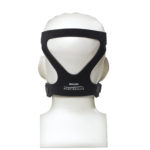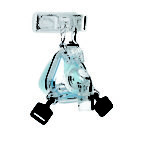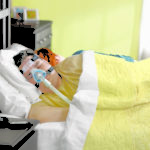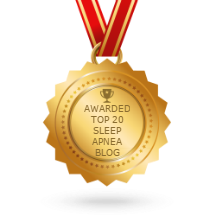
Many Benefits of CPAP
CPAP or continuous positive airway pressure, is one of the most effective cures for obstructive sleep apnea (OSA). A CPAP machine maintains a steady flow of air into your system, keeping your airways open. It also restores normal levels of oxygen while you sleep. Along with normalizing the breathing of people suffering from sleep apnea, CPAP also helps to protect them from health risks associated with OSA.
What are the Benefits of CPAP Use?
Improved sleep
The most important benefit of CPAP use for people with OSA is better sleep quality.
Fights fatigue
Without a good night’s sleep, people often feel sluggish and fatigued during the day. This is especially important to commercial drivers who need to stay alert and focused behind the wheel. With the use of CPAP, night sleeping patterns are improved, reducing fatigue during the day.
Lessens chance of heart diseases
Sleep apnea causes pauses in breathing throughout the night. These pauses result in drastic changes in the levels of oxygen, which puts a strain on the heart — increasing the heart rate. Use of CPAP machine helps to maintain steady air flow to the system and helps prevent many heart related diseases like congestive heart failure and coronary artery disease.
Improves diabetes
Obstructive sleep apnea (OSA) causes insulin resistance and glucose intolerance in the patients. Use of CPAP helps to improve insulin sensitivity, in type II diabetics.
Slows down the emotional roller coaster
People using CPAP usually exhibit decreased levels of anxiety and depression, and improvement in emotional stability.
Improved focus
Using CPAP improves sleep, ability to think, and concentrate. Users are able to make better decisions at both work and in personal life. Enhancing their overall productivity.
Overall health
Sleeping and breathing better improves your overall health. Which could mean less trips to the doctor. Which gives users more time to do the things they love.
CPAP should be used the whole night and even while taking naps. The body needs to adjust to using the CPAP machine. Using it only part of the time could be risky. So if you are suffering from OSA, use CPAP and improve your health.

How to Choose a CPAP Machine
This introduction to CPAP Machines should help you understand how to buy a CPAP machine, the different types of machines, and the many features that are available.
Do I Need a Prescription?
All CPAP and CPAP Masks, from any online vendor, require a prescription. Prescriptions can be faxed to us or emailed to info@CPAPAMERICA.com. We accept scanned copies, photocopies, and even pictures from your cell phone or camera.
How Do I get a Copy of My Prescription?
If you don’t have a copy of your prescription, we can help. You must have had some contact with a physician in the past who did prescribe CPAP therapy. We can contact your doctor on your behalf and attempt to get a copy of your prescription for you. All we need is your name, your date of birth, and your doctor’s phone number.
Types of Machines
There are three basic types of machines, CPAP, APAP or Auto CPAP, and BiPAP:
- CPAP Machines – The most basic machine. A CPAP machine delivers a consistent amount of air pressure, measured in centimeters of water pressure or cm/H2O, via a CPAP mask. The air pressure helps to push back the soft palette of a patient and maintain an open airway. A basic CPAP machine is all most patients need to accomplish this. Different machines have different features and abilities.
- APAP Machines or Auto CPAP Machines – Auto Adjusting Positive Airway Pressure or APAP machines are another type of machine used to non-invasively treat Sleep Apnea. Instead of delivering one or two set pressures like a CPAP or BiPAP machine, the APAP machine adjusts with each breath to your ideal pressure. It can adjust for sleeping position, weight fluctuations, or anything else that can change the pressure required to keep your airway open. People often find these machines to be the most comfortable and some prefer them because many offer more therapy tracking information that can be reported to your doctor. Every machine comes with a power cord, filter, and hose (tubing), and can be enhanced with additional elements such as heated humidifiers, therapy tracking software, and off-grid power options. They are small enough to fit on a bedside table and some are convenient for traveling.
- BiPAP Machines — BiPAP, or bi-level positive airway pressure helps keep the upper airways of the lungs open by providing a flow of air delivered through a face mask. With BiPaP, a doctor prescribes specific pressures that alternate: A higher pressure is used to breathe in (called inspiratory positive airway pressure, or IPAP) and a lower pressure is used when breathing out (called expiratory positive airway pressure, or EPAP). BiPAP Therapy is very popular for COPD patients over CPAP Therapy.
Data Recording and Compliance Reporting
Some machines record only usage hours, while others can be very detailed in their data recording including actually monitoring hypopneas and your sinus rhythm.
Data recording is usually performed by request of your sleep doctor or PCP. Some manufacturers offer the ability for a patient to view the data via software or a website, while others restrict the data to doctors only.
For example, most of the Respironics System One devices have data recording capabilities. The depth of recording changes depending on the model. For example, the Basic CPAP has no ability, but the Plus and Pro models have more ability.
The type of data recorded, the method, and the physical media all change between manufacturers. If your doctor has requested data for compliance information, please check with us before purchase to ensure you are getting the right type.
Do I Need a Humidifier?
You don’t have to have humidification, but it makes CPAP therapy so much more comfortable to use warm and moist air than cool dry air. All machines have the option of using a heated humidifier and it is by far the most popular choice. Plus, all machines have the option of either separating the CPAP from the humidifier, or turning off the humidifier if needed.
Features
- Leak Compensation – Small leaks in your mask can cause a pressure drop. CPAP machines with this feature can compensate for those small air leaks to help keep the prescribed pressure at all times.
- Mask On/Off Alert – A small beep, or at the least a message on the LCD will alert you if the mask is off. This is especially helpful for patients who involuntarily pull the mask off during sleep.
- Altitude Adjustment – The altitude you live in can cause changes to the air pressure being delivered. Most CPAP machines either automatically adjust for high altitudes, or have a manual switch.
- Heated Tubing – A small heating element is placed in the tubing to keep the air at a constant temperature. This helps prevent condensation in the tubing that is also called “rain-out”.
- Voltage Selection – Most machines have the ability to switch from standard US voltages to international voltages.
- Ramp – When you first start your nightly CPAP, the CPAP machine will start a low pressure and slowly ramp to the prescribed pressure. This helps you fall asleep faster under low pressures, or simply to adjust to the higher pressures while reading or watching television before you go to sleep. Ramp times are usually set between 0-45 minutes.
- Warranties – CPAPAmerica.com handles all warranty claims for devices that we sell. If you have a problem with your machine, call our Customer Service Department.

Maggie’s Law & Drowsy Driving
What is Maggie’s Law?
Maggie’s Law states that a sleep-deprived driver qualifies as a reckless driver who can be convicted of vehicular homicide. The law is named in honor of a 20-year-old college student, Maggie McDonnell, who was killed when a driver crossed three lanes of traffic and struck her car head-on in 1997. The driver admitted that he hadn’t slept for 30 hours and had been using drugs.
When the case went to trial, the jury was deadlocked. In a second trial, the defense argued that because there was no law against falling asleep at the wheel in New Jersey, the driver did nothing wrong. The judge accepted this argument, and the driver received only a suspended jail sentence and a $200 fine.
That decision was unacceptable to Maggie’s mom, Carole McDonnell. She fought for a law to punish drowsy drivers in New Jersey. Maggie’s Law defines fatigue as “being without sleep for more than 24 consecutive hours” and makes driving while fatigued a criminal offense.
Get Tested for Sleep Apnea
Don’t drive drowsy. If you think that you suffer from sleep apnea, talk to your doctor, get tested and find out more about CPAP therapy to give yourself a more restful night’s sleep. CPAPAmerica.com can help you with all of your CPAP machine and sleep apnea testing needs.

